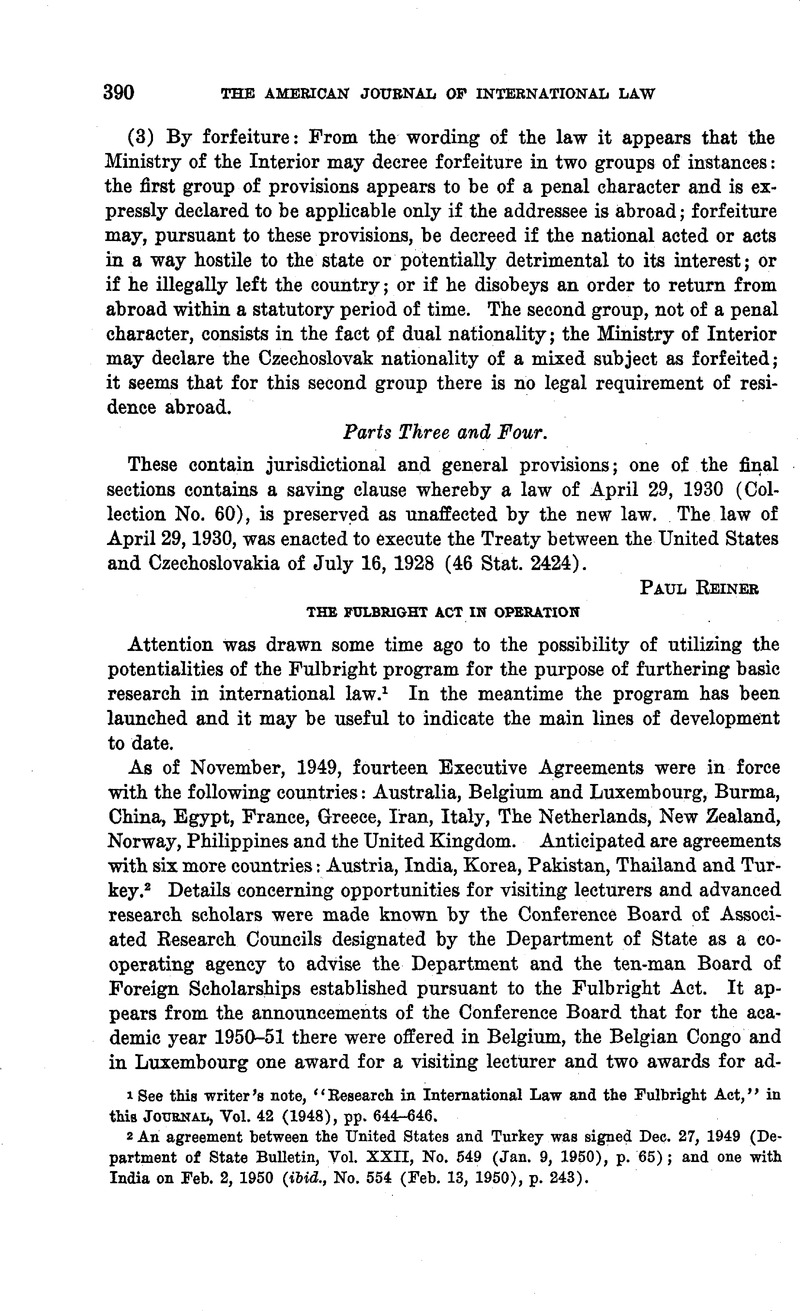No CrossRef data available.
Published online by Cambridge University Press: 20 April 2017

1 See this writer's note, “Besearch in International Law and the Fulbright Act,” in this JOURNAL, Vol. 42 (1948), pp. 644-646.
2 An agreement between the United States and Turkey was signed Dec. 27, 1949 (Department of State Bulletin, Vol. XXII, No. 549 (Jan. 9, 1950), p. 65); and one with India on Feb. 2, 1950 (ibid., No. 554 (Feb. 13, 1950), p. 243).
3 The Report on Public Meeting of the Board of Foreign Scholarships, March 30, 1949, Cleveland, Ohio, states: “Awards to graduate students will be made only for a full academic year. In the case of professors, teachers, and research scholars, exceptions will be made to provide awards for shorter periods, notably in connection with teaching in recognized summer schools or for one semester during the regular sessions of approved institutions, and writing projects involving research or observation of not less than three months' duration.”
4 The Conference Board of Associated Besearch Councils declared that in general, the following formula is used as the basis for arriving at the total amount included in anaward: “a. A basic living allowance is provided which approximates $5,000 for those in the status of professors, associate professors or assistant professors and $4,000 for those in the status of instructors. These amounts are merely index figures and are subject to changes in exchange rates and living costs varying from country to country. “b. The award may also include a supplemental cost-of-living allowance adjusted to living costs in the country of residence and to the number of dependents accompanying the grantee. It is anticipated that a limited number of dependents will normally accompany grantees in the categories of visiting lecturers and research scholars. The supplemental cost-of-living allowance is intended in conjunction with the basic allowance to cover the expenses of the grantee and his family on a scale commensurate with his position, without unwarrentedly emphasizing differences which may exist between what the grantee receives and the salaries of his foreign colleagues. “c. Round-trip transportation is normally provided the grantee from the port of embarkation in the United States to the point of destination and return. Transportation costs within the United States will be paid whenever the respective foreign currencies can be used for this purpose. Transportation of dependents is not separately provided, but arrangements may sometimes be made for the purchase of passage for dependents in foreign currencies, the cost being subsequently deducted from the award in order to spare the grantee the necessity of expending dollars. “d. A special allowance for incidental expenses, ordinarily not to exceed the equivalent of $500, will be provided as needed and justified to take care of such expenses as equipment, secretarial assistance, or local travel in connection with the assignment.” See Information Concerning United States Government Grants to Visiting Lecturers and Research Scholars under Public Law 584, Seventy-ninth Congress (The Fulbright Act), dated Oct. 15, 1947, pp. 5-6.
5 Burma, Greece, Italy, Philippines and the United Kingdom Colonial Dependencies and Special Category Awards.
6 Necessary qualifications are described by the Department of State as follows: “A guiding principle in the selection of candidates for grants under the Fulbright Act is that candidates possess the abilities and personal characteristics which will enable them to develop a true understanding of the people in the host country and, upon their return, to communicate an honest impression of this experience to their fellow citizens. “The field of study, teaching, or research which is proposed by applicants for these grants is of secondary importance in the selection process. However, the educational resources which exist in a given country may be such as to encourage academic work in certain special fields and not in others. The field of study and the type of experience which the candidate indicates in his project proposal are therefore important elements in the process of selection. In all cases, grants under the act are awarded on the basis of broad competition initiated through wide public announcement.” Educational Exchanges under the Eulbright Act (Department of State Publication 3657, International Information and Cultural Series 9, December, 1949), pp. 7-8.
7 Application forms for the United Kingdom and British Colonial Dependencies, Belgium and Luxembourg, France, Greece, Italy, The Netherlands, Burma, the Philippines, New Zealand and Norway, for the academic year 1951-52 will be accepted by the Conference Board Committee in the late summer or early autumn, when the programs for that year are available. At that time application forms and information concerning the programs will be sent to those interested in applying for an award. No programs have yet been initiated in Australia, Egypt, Iran, Turkey and India. Application forms and other necessary information will be sent to interested individuals as soon as programs are inaugurated in those countries.
8 See Information (supra, note 4), p. 1.
9 Other criteria for the evaluation of projects are: “(2) particular aspects of the project which make it necessary or distinctly desirable to be carried out in the proposed host institution; (3) possible contribution to or coordination with other educational, scientific or cultural programs of the United States; (4) academic or professional soundness of the project.” See Eeport on Public Meeting (supra, note 3), p. 7.
10 “The Conference Board of Associated Besearch Councils is a joint agency of the American Council on Education, the American Council of Learned Societies, the National Besearch Council and the Social Science Besearch Council. . . .It carries out its responsibilities through an eight-man Committee (two representatives from each Council) with a secretariat attached for administrative purposes to the National Besearch Council which is the operating agency of the National Academy of Sciences.” See Information, supra, note 4.
11 All quotations from Information, supra, note 4.